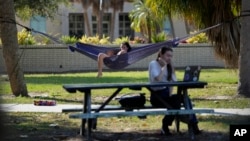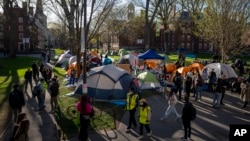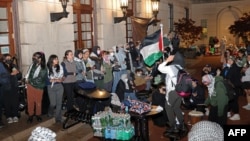Student Union
- By VOA News
India Today's top US colleges for international students
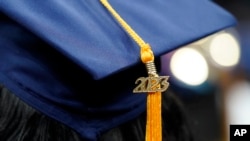
India Today has a rundown on its top five U.S. colleges for international students.
Think it's all about the Ivy League? Guess again. Get the list here. (June 2024)
- By Reuters
MIT's enrollment of Black, Latino students drops after affirmative action ban
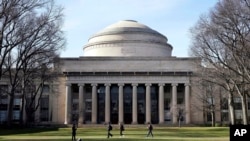
The Massachusetts Institute of Technology's incoming freshman class this year dropped to just 16% Black, Hispanic, Native American or Pacific Islander students compared to 31% in previous years after the U.S. Supreme Court banned colleges from using race as a factor in admissions in 2023, the elite engineering school said.
The proportion of Asian American students in the incoming class rose from 41% to 47%, while white students made up about the same share of the class as in recent years.
MIT administrators said the statistics are the result of the Supreme Court's decision last year to ban affirmative action, a practice that many selective U.S. colleges and universities used for decades to boost enrollment of underrepresented minority groups.
Harvard and the University of North Carolina, the defendants in the Supreme Court case, argued that they wanted to promote diversity to offer educational opportunities broadly and bring a range of perspectives to their campuses. The conservative-leaning Court ruled that their race-conscious admissions practices violated the U.S. Constitution's promise of equal protection under the law.
"The class is, as always, outstanding across multiple dimensions," MIT President Sally Kornbluth said in a statement about the Class of 2028.
"But what it does not bring, as a consequence of last year’s Supreme Court decision, is the same degree of broad racial and ethnic diversity that the MIT community has worked together to achieve over the past several decades."
This year's freshman class at MIT is 5% Black, 1% American Indian/Alaskan Native, 11% Hispanic and 0% Native Hawaiian/Pacific Islander. It is 47% Asian American and 37% white. (Some students identified as more than one racial group).
By comparison, the past four years of incoming freshmen were a combined 13% Black, 2% American Indian/Alaskan Native, 15% Hispanic and 1% Native Hawaiian/Pacific Islander. The previous four classes were 41% Asian American and 38% white.
U.S. college administrators revamped their recruitment and admissions strategies to comply with the court ruling and try to keep historically marginalized groups in their applicant and admit pool.
Kornbluth said MIT's efforts had apparently not been effective enough, and going forward the school would better advertise its generous financial aid and invest in expanding access to science and math education for young students across the country to mitigate their enrollment gaps.
California announces new deal with tech to fund journalism, AI research

California will be the first U.S. state to direct millions of dollars from taxpayer money and tech companies to help pay for journalism and AI research under a new deal announced Wednesday.
Under the first-in-the-nation agreement, the state and tech companies would collectively pay roughly $250 million over five years to support California-based news organization and create an AI research program. The initiatives are set to kick in in 2025 with $100 million the first year, and the majority of the money would go to news organizations, said Democratic Assemblymember Buffy Wicks, who brokered the deal.
"This agreement represents a major breakthrough in ensuring the survival of newsrooms and bolstering local journalism across California — leveraging substantial tech industry resources without imposing new taxes on Californians," Gov. Gavin Newsom said in a statement. "The deal not only provides funding to support hundreds of new journalists but helps rebuild a robust and dynamic California press corps for years to come, reinforcing the vital role of journalism in our democracy."
Wicks' office didn't immediately answer questions about specifics on how much funding would come from the state, which news organizations would be eligible and how much money would go to the AI research program.
The deal effectively marks the end of a yearlong fight between tech giants and lawmakers over Wicks' proposal to require companies like Google, Facebook and Microsoft to pay a certain percentage of advertising revenue to media companies for linking to their content.
The bill, modelled after a legislation in Canada aiming at providing financial help to local news organizations, faced intense backlash from the tech industry, which launched ads over the summer to attack the bill. Google also tried to pressure lawmakers to drop the bill by temporarily removing news websites from some people's search results in April.
"This partnership represents a cross-sector commitment to supporting a free and vibrant press, empowering local news outlets up and down the state to continue in their essential work," Wicks said in a statement. "This is just the beginning."
California has tried different ways to stop the loss of journalism jobs, which have been disappearing rapidly as legacy media companies have struggled to profit in the digital age. More than 2,500 newspapers have closed in the U.S. since 2005, according to Northwestern University's Medill School of Journalism. California has lost more than 100 news organizations in the past decade, according to Wicks' office.
The Wednesday agreement is supported by California News Publishers Association, which represents more than 700 news organizations, Google's corporate parent Alphabet and OpenAI. But journalists, including those in Media Guild of the West, slammed the deal and said it would hurt California news organizations.
State Sen. Steve Glazer, who authored a bill to provide news organizations a tax credit for hiring full-time journalists, said the agreement "seriously undercuts our work toward a long-term solution to rescue independent journalism."
State Senate President Pro Tempore Mike McGuire also said the deal doesn't go far enough to address the dire situation in California.
"Newsrooms have been hollowed out across this state while tech platforms have seen multi-billion-dollar profits," he said in a statement. "We have concerns that this proposal lacks sufficient funding for newspapers and local media and doesn't fully address the inequities facing the industry."
Discarded gender and diversity books trigger new culture clash at Florida college
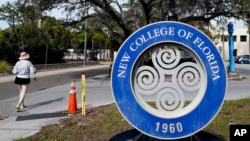
When hundreds of books got hauled away in a dumpster from the library of the New College of Florida on Thursday, the tiny liberal arts college with a governing board dominated by appointees of Republican Gov. Ron DeSantis once again found itself at the center of the state's culture wars.
"We abolished the gender studies program. Now we're throwing out the trash," Christopher Rufo, a DeSantis appointee to the Sarasota college's governing board, posted Friday on X, formerly Twitter.
The American Civil Liberties Union, meanwhile, condemned the college for "a brazen act of censorship."
"These actions are nothing short of a cultural purge, reminiscent of some of history's darkest times, where regimes sought to control thought by burning books and erasing knowledge," Bacardi Jackson, executive director of the ACLU of Florida, said in a statement.
Both sides were responding to accounts spread through social media that officials at the campus of roughly 700 students had sent a large collection of books from the college's recently shuttered gender studies program to a local landfill.
But a statement by New College administrators said people were confusing two different batches of books. It said volumes taken away by dumpster came from a routine culling of the main library's collection, largely to get rid of old and damaged books. Books related to gender studies, it said, were also placed outside the library and "were later claimed by individuals planning to donate the books locally."
A student who alerted classmates to the book dumping told The Associated Press that she saw two large boxes filled with books Thursday at the campus' student-run Gender and Diversity Center, located in a building where staff were busy moving furniture, repainting and otherwise preparing for students to return to campus next week.
Natalia Benavides said those boxes got moved to the library parking lot near the dumpster, but fellow students and activists responding to her alert managed to save most of the Gender and Diversity Center's books before they got thrown away.
"Primarily what was in the dumpster were library books —- they were stamped with 'discard' and they were bound so that you knew they were from the library," said Benavides, a fourth-year student. "They seemed to be of every topic under the sun: art history books, books on aesthetics, psychology books."
It's not surprising that discarding books would trigger controversy at New College. Known for decades as a progressive school with a prominent LGTQ+ community, the campus became a target for DeSantis and as war on "woke." In early 2023, the governor overhauled the college's Board of Trustees by installing a majority of conservative members.
The new trustees promptly fired the college president and replaced her with a Republican politician. Several other administrators also lost their jobs. The board dismantled the office of diversity and equity and a year ago voted to shut down the campus' gender studies program.
"Every couple of months, they have destroyed some part of this campus whether it is physical spaces or our books," said Amy Reid, the professor who led the college's gender studies program and now plans a yearlong leave of absence.
Reid said she believes books were removed from the Gender and Diversity Center, a student-run office that was independent of the academic gender studies program, because it's also being shuttered. She said the center's sign was also taken down and that it had housed more than two boxes of books, many of which she suspects ended up in the trash.
"Was I surprised that this happened?" Reid said. "No, because we've seen an effort to refashion this campus and make it unwelcoming."
New College's statement said only that books "associated with the discontinued Gender Studies program" had been removed from a room "that is being repurposed." A college spokesperson, Nate March, declined to to answer further questions.
Zander Moricz, who leads a group of student activists called the SEE Alliance, said books from the Gender and Diversity Center that were nearly thrown out included volumes on slavery, a collection of Jewish stories and three copies of the Bible.
Campus police prevented students from retrieving books from the dumpster, he said, which was loaded onto a truck that members of his group followed to a local landfill.
"The vast majority of the books were 100% readable and in good condition," Moricz said.
The American Library Association encourages academic libraries to cull books in poor physical condition or no longer deemed accurate or relevant — though its guidelines say books should never be removed because they're controversial.
Association spokesperson Jean Hodges said it's up to individual libraries what to do with removed books.
"Donation, recycling, resale, and disposal all fall within normal practice," Hodges said by email.
US colleges revise rules on free speech in hopes of containing anti-war demonstrations
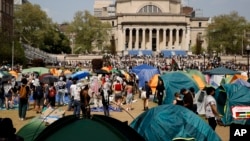
As students return to colleges across the United States, administrators are bracing for a resurgence in activism against the war in Gaza, and some schools are adopting rules to limit the kind of protests that swept campuses last spring.
While the summer break provided a respite in student demonstrations against the Israel-Hamas war, it also gave both student protesters and higher education officials a chance to regroup and strategize for the fall semester.
The stakes remain high. At Columbia University, President Minouche Shafik resigned Wednesday after coming under heavy scrutiny for her handling of the demonstrations at the campus in New York City, where the wave of pro-Palestinian tent encampments began last spring.
Some of the new rules imposed by universities include banning encampments, limiting the duration of demonstrations, allowing protests only in designated spaces and restricting campus access to those with university identification. Critics say some of the measures will curtail free speech.
The American Association of University Professors issued a statement Wednesday condemning “overly restrictive policies” that could discourage free expression. Many of the new policies require protesters to register well in advance and strictly limit the locations where gatherings can be held, as well as setting new limits on the use of amplified sound and signage.
“Our colleges and universities should encourage, not suppress, open and vigorous dialogue and debate even on the most deeply held beliefs,” said the statement, adding that many policies were imposed without faculty input.
The University of Pennsylvania has outlined new “temporary guidelines” for student protests that include bans on encampments, overnight demonstrations, and the use of bullhorns and speakers until after 5 p.m. on class days. Penn also requires that posters and banners be removed within two weeks of going up. The university says it remains committed to freedom of speech and lawful assembly.
At Indiana University, protests after 11 p.m. are forbidden under a new “expressive activities policy” that took effect August 1. The policy says “camping” and erecting any type of shelter are prohibited on campus, and signs cannot be displayed on university property without prior approval.
The University of South Florida now requires approval for tents, canopies, banners, signs and amplifiers. The school’s “speech, expression and assembly” rules stipulate that no “activity,” including protests or demonstrations, is allowed after 5 p.m. on weekdays or during weekends and not allowed at all during the last two weeks of a semester.
A draft document obtained over the summer by the student newspaper at Harvard University showed the college was considering prohibitions on overnight camping, chalk messages and unapproved signs.
“I think right now we are seeing a resurgence of repression on campuses that we haven’t seen since the late 1960s,” said Risa Lieberwitz, a Cornell University professor of labor and employment law who serves as general counsel for the AAUP.
Universities say they encourage free speech as long as it doesn’t interfere with learning, and they insist they are simply updating existing rules for demonstrations to protect campus safety.
Tensions have run high on college campuses since the October 7 Hamas terror attack in southern Israel killed 1,200 people, most of them civilians, and took about 250 hostages.
Many student protesters in the U.S. vow to continue their activism, which has been fueled by Gaza’s rising death toll, which surpassed 40,000 on Thursday, according to the territory’s Health Ministry.
About 50 Columbia students still face discipline over last spring’s demonstrations after a mediation process that began earlier in the summer stalled, according to Mahmoud Khalil, a lead negotiator working on behalf of Columbia student protesters. He blamed the impasse on Columbia administrators.
“The university loves to appear that they’re in dialogue with the students. But these are all fake steps meant to assure the donor community and their political class,” said Khalil, a graduate student at Columbia’s School of International and Public Affairs.
The university did not immediately respond to a request for comment Thursday.
The Ivy League school in upper Manhattan was roiled earlier this year by student demonstrations, culminating in scenes of police officers with zip ties and riot shields storming a building occupied by pro-Palestinian protesters.
Similar protests swept college campuses nationwide, with many leading to violent clashes with police and more than 3,000 arrests. Many of the students who were arrested during police crackdowns have had their charges dismissed, but some are still waiting to learn what prosecutors decide. Many have faced fallout in their academic careers, including suspensions, withheld diplomas and other forms of discipline.
Shafik was among the university leaders who were called for questioning before Congress. She was heavily criticized by Republicans who accused her of not doing enough to combat concerns about antisemitism on the Columbia campus.
She announced her resignation in an emailed letter to the university community just weeks before the start of classes on September 3. The university on Monday began restricting campus access to people with Columbia IDs and registered guests, saying it wanted to curb “potential disruptions” as the new semester draws near.
“This period has taken a considerable toll on my family, as it has for others in the community,” Shafik wrote in her letter. “Over the summer, I have been able to reflect and have decided that my moving on at this point would best enable Columbia to traverse the challenges ahead.”
Pro-Palestinian protesters first set up tent encampments on Columbia’s campus during Shafik’s congressional testimony in mid-April, when she denounced antisemitism but faced criticism for how she responded to faculty and students accused of bias.
The school sent in police to clear the tents the following day, only for the students to return and inspire a wave of similar protests at campuses across the country as students called for schools to cut financial ties with Israel and companies supporting the war.
The campus was mostly quiet this summer, but a conservative news outlet in June published images of what it said were text messages exchanged by administrators while attending a May 31 panel discussion titled “Jewish Life on Campus: Past, Present and Future.”
The officials were removed from their posts, with Shafik saying in a July 8 letter to the school community that the messages were unprofessional and “disturbingly touched on ancient antisemitic tropes.”
Other prominent Ivy League leaders have stepped down in recent months, largely because of their response to the volatile protests on campus.
University of Pennsylvania President Liz Magill resigned in December after less than two years on the job. She faced pressure from donors and criticism over testimony at a congressional hearing where she was unable to say under repeated questioning that calls on campus for the genocide of Jews would violate the school’s conduct policy.
And in January, Harvard University President Claudine Gay resigned amid plagiarism accusations and similar criticism over her testimony before Congress.




